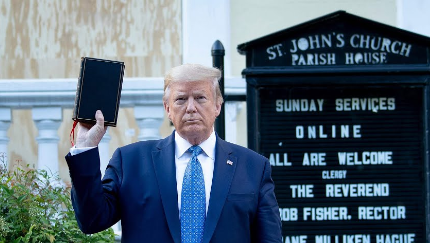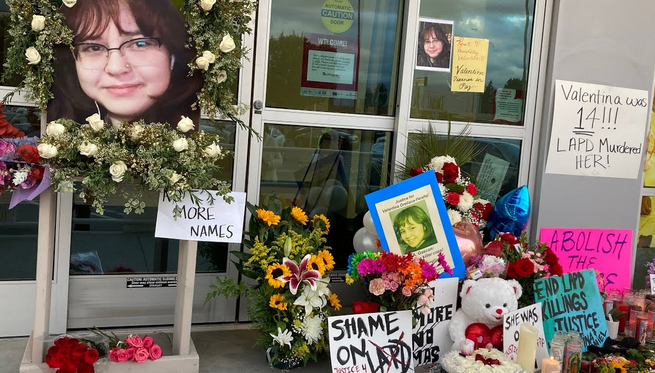Photo: YouTube
Trump (above) giving a Bible shoutout to his white right-wing “Christian” fundamentalist supporters.
Across America, right-wing politicians pass “religious freedom” laws that have a single purpose: to let narrow-minded believers discriminate against gays — an intolerance that is illegal for other people under human rights laws.
In other words, only born-again Christians are allowed to express prejudice and hostility, while other Americans live by kinder standards.
Actually, around the world, there’s a clear pattern: Strong religion produces judgmental, bigoted attitudes. Fundamentalists are unforgiving, less accepting of outcasts. Puritans are quick to condemn.
In the 2016 U.S. presidential election, Donald Trump exuded racism and ethnic intolerance. He implied that America’s first Black president was born in Kenya. He demanded a wall to keep out Hispanics. He tried to block Muslims from entering the United States. Trump also degraded women and boasted of grabbing their genitals. His slogan of “Make America great again” was perceived as “Make America white again.”
Surprisingly, Trump’s most ardent supporters were white evangelicals, who backed him by an astounding 81 percent at the polls. It seemed as if those fundamentalists eagerly embraced bigotry.
It’s an old story: Less-educated white churchgoers have a record of discrimination. In the 1950s, big-time evangelist Jerry Falwell preached against racial integration, saying it “will destroy our race eventually.” After integration arrived, he founded the Lynchburg Christian Academy for whites – a “seg academy” designed to evade association with Blacks.
In the 1970s, tax-exemption was stripped from segregated religious schools – which impelled white evangelicals to become a belligerent political force, the “Christian right” attached to the Republican Party. Today, that segment is a strong bastion of intolerance.
Christianity Today, the foremost evangelical magazine, recently lamented:
“Every week, we are treated to another revelation about the alarming attitudes of white evangelical Christians.” It said kind-hearted people should “find President Trump’s closing the door to the world’s neediest refugees repulsive. But white evangelicals support Trump’s exclusionary policy by a whopping 76 percent…. White evangelical Christians, more than any other religious group, say illegal immigrants should be identified and summarily deported.”
The article concluded that too many white evangelicals “show little mercy for those who are not white Americans.”
College professor David Myers, who grew up in born-again churches, wrote: “Despite my roots in evangelical Christianity, I no longer claim that identity. I don’t want to be associated with the prejudice and intolerance that the word ‘evangelical’ now, alas, so often connotes.”
A gathering of fundamentalists drafted a “Nashville Statement” declaring war on “homosexual immorality or transgenderism.” (Some social media comments branded it “un-American toilet paper written by hypocrites.”)
Washington Post columnist Michael Gerson wrote that, by embracing Trump, born-again believers are “associating evangelicalism with bigotry, selfishness and deception. They are playing a grubby political game for the highest of stakes: the reputation of their faith.”
However, I think the reputation of their faith has been rather obvious for a long time.
James Haught, syndicated by PeaceVoice, is editor emeritus of West Virginia’s largest newspaper, The Charleston Gazette-Mail, and author of 12 books.












